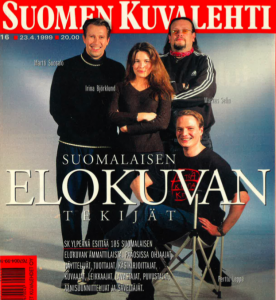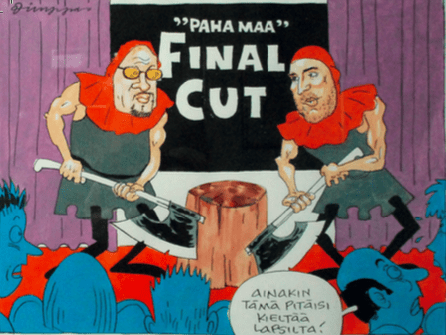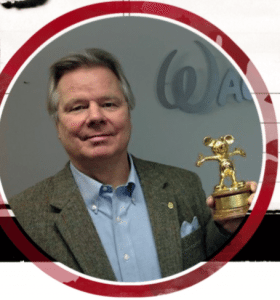I guaranteed a million – Markus tore the contract apart
Jussi Mäkelä started his career in 1978 in the family business Kinosto Oy, established by his grandfather Wäinö Mäkelä back in 1920. Jussi, his cousin Jukka and his friend Markku Koistinen founded Finnkino in 1986. After his tenure there, Jussi became the CEO of Buena Vista International Finland in 1998, a distribution company for all Disney films. These days, the company is called The Walt Disney Company Nordic.
My journey with Markus has lasted over thirty years – and every step has been colorful. I met Markus in the 80’s and our first feature together was “Born American”; I was in charge of the marketing in Kinosto at the time.
We made several headlines: the censors were mothballing the movie, demanding several recuts. I was young and eager – and took the trailer straight to the biggest theater in the city, forgetting to have it approved by the censors.
The opening gala in Cafe Metropol, with all the performers, was an unforgettable and an insurmountable event – no one has ever done it better. The host of the evening was Kari Salmelainen, a popular dating program celebrity. Simo Salminen took the stage to perform “The Protest Song” and the main artist of the evening was the legendary Reijo K. Hirvelä, arriving only slightly late, straight from New York.
The first feature of Solar Films, “The Sunset Riders” (11.11.1994) was distributed by me and my team, during my tenure in Finnkino. A great picture – but the premiere was completely at the wrong time, one week after Mollberg’s “The Children of Paradise”, with an audience of 2500. Back in the day domestic movies were like curse words and The Sunset Riders unfortunately never broke the 20 000 mark. No doubt, one of the biggest disappointments of my career; that movie had potential to be a major success.
It went in like a butt to a bucket.
“The Goldrush” (5.12.1997) became a major success, but getting that production on the tracks didn’t happen without hiccups, either. The existing management of Finnkino didn’t appreciate domestic cinema and refused to finance the screening prints of the film. The manager of Finnlab was not happy with situation; most domestic films had flopped and the producers had left the copies unpaid. Our premiere date was approaching fast, creative moves were called for. I trusted the potential of the movie so much, that I guaranteed the screening copies personally. To my luck the movie opened big and the invoice of the prints was paid from the marketing costs in due time and in a diligent manner.
 The next movie of Solar was the phenomenal “The Tough Ones” (15.1.1999), drawing an audience of 330 000. Even that story had its hardships. Disney had been established to Finland and besides managing that company, I was also the chairman of the board at the Finnish Film Foundation. Together with the CEO of the Foundation Jouni Mykkänen we had created a strategy to get the Finnish cinema out of the woods.
The next movie of Solar was the phenomenal “The Tough Ones” (15.1.1999), drawing an audience of 330 000. Even that story had its hardships. Disney had been established to Finland and besides managing that company, I was also the chairman of the board at the Finnish Film Foundation. Together with the CEO of the Foundation Jouni Mykkänen we had created a strategy to get the Finnish cinema out of the woods.
Jouni called me before the first decisive meeting in 1998 and informed that production adviser Astala had taken a shine to an urban comedy about “a man collecting pubic hair” – a liking to the extent of giving a full support to this masterpiece. I said to Mykkänen, that we must prevent this mistake and he should intervene, by splitting the monies in half and giving an equal sum to two movies: “The Tough Ones” and “The Tramp and the Swan”. With the benefit of hindsight, it can be said that Mykkänen’s decision to walk over Astala was correct – and it was also one of the factors to help the domestic cinema to rise to its present level. “The Tramp and the Swan”, directed by Timo Koivusalo, did solid business as well, with an audience of 235 000. My educated guess is that Astala’s favorite project of the time, should it have seen the light of day, would not have drawn such audiences…
“The South”, directed by Aleksi Mäkelä, demanded similar creativity than “The Goldrush”. The premiere was approaching and I wasn’t on the same page with Disney (the language barrier) – so I cut a few corners and signed a distribution contract of one million marks, expecting an audience of 150 000.
Much more important than our major mutual successes is that we’ve always had a lot of fun together!
After the opening weekend figures, sweat started to pour down from my temples and I was trying to figure out how to explain my questionable creativity to my employer.
With the final figure of 70 000, Disney would not have patted my back, if we had been obliged to recoup the extra million. One day Masi called me and asked, if I remembered signing the contract in question. Two weeks of badly slept nights hadn’t erased my creative stupidity – so I presumed it was the payday.
Masi asked me to listen carefully; I was expecting him to go through the details of our contract. But the only thing I heard from the phone was the sound of ripping paper; he tore the contract apart. This is a proof of his great attitude towards life; my buddy Markus is like that to his friends – and that’s also his way of conducting business.
The problems with the movie “Frozen Land” and the way he solved them also tell their story about his professionalism and attitude. Disney had invested a large minimum guarantee (mg) in the picture, and the director Aku Louhimies delivered an overlong saga of anxiety and agony – which in our opinion had zero possibility of box office success.

Masi jumped to the producer’s seat and saved the movie, by editing it into a masterpiece, despite Aku’s resistance. The events created a lot of publicity, the stakes were enormous. The options included the bankruptcy of Solar and the end of distribution of domestic films for Disney.
The end result was almost 200 000 spectators and eight Finnish Film Awards. But more important than the economical success and the awards is the fact that Masi wiped the heavy process from his mind and has never showed any bitterness towards Aku. A mark of a great producer, a sign of a big human being.
Also unforgettable is the report of my colleague Inger, from the promotional tour of Matti Nykänen and Jasper Pääkkönen in Oslo. They made more headlines in Norway than ever before – unfortunately the publicity didn’t correlate with the box office revenues.
Altough Disney is not distributing Solar Films’ movies at the moment, our friendship has continued and we exchange opinions of the upcoming productions with same enormous trust and candor as always. Thank you Solar, Markus, Jukka, Rampe, Tane, Leppä, Mika and all of you, for the moments of the past.
Much more important than our major mutual successes (“Bad Boys”, “Hell is for Heroes”, “Restless” etc.) is that we’ve always had a lot of fun together.
Our journey together is best described by Rampe’s unforgettable comment, after a successful car parking: “It went in like a butt to a bucket”.
The Mouse House congratulates the 20-year old Solar and wishes the best of success in the future.




